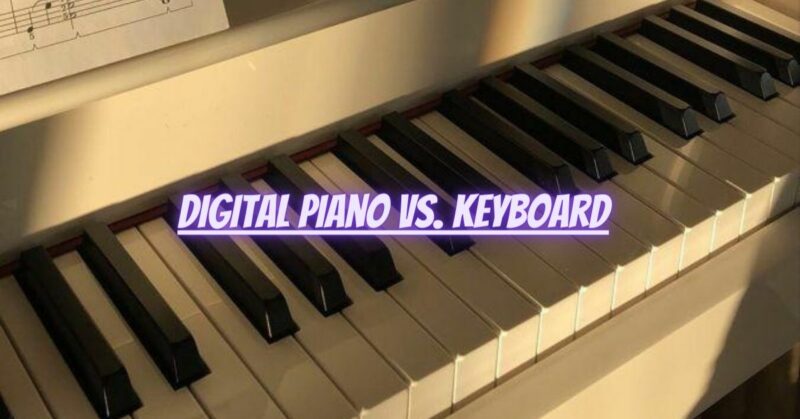For anyone interested in learning to play the piano or looking to add a keyboard instrument to their musical repertoire, the choice between a digital piano and a keyboard is an important decision. Both instruments have their unique features and benefits, and understanding their differences can help you make an informed choice that suits your musical goals and preferences. In this article, we’ll explore the distinctions between digital pianos and keyboards to aid you in selecting the perfect instrument.
**1. ** Sound Quality:
One of the most significant differences between digital pianos and keyboards lies in their sound quality. Digital pianos are designed to closely replicate the sound and feel of an acoustic piano. They use advanced sampling technology to capture the rich tones of acoustic pianos, offering authentic sound and nuances that mimic the real thing. The sound in digital pianos is typically produced through high-quality speakers, and some models even have built-in amplification systems to further enhance the sound.
Keyboards, on the other hand, offer a wide range of sounds, including piano, but their primary focus is on versatility. They are designed to imitate various instruments, such as electric pianos, organs, strings, synthesizers, and more. While some keyboards do a decent job at emulating piano sounds, they may not match the depth and authenticity of a dedicated digital piano.
**2. ** Key Action and Feel:
The feel of the keys is another significant distinction between digital pianos and keyboards. Digital pianos often come with weighted or semi-weighted keys, which simulate the feel of an acoustic piano. This means that the keys have some resistance, providing a more authentic piano playing experience. Weighted keys require more finger strength and control, making them ideal for those looking to develop proper piano technique.
On the other hand, keyboards typically have non-weighted or synth-action keys. These keys are lighter and spring back more quickly after being pressed, making them easier to play. While this can be advantageous for certain styles and beginners who are not yet accustomed to playing on weighted keys, it may not offer the same level of expressiveness and touch sensitivity as a digital piano.
**3. ** Portability and Size:
Portability and size are essential considerations for many musicians, especially those who are frequently on the move or have limited space at home. Keyboards are generally more compact and lightweight, designed for easy transportation and storage. They are a popular choice for gigging musicians and those who need an instrument that can be easily taken to rehearsals or performances.
Digital pianos, on the other hand, can vary in size and weight. Some models are more portable than others, but in general, they are bulkier and heavier compared to keyboards. While some digital pianos can be moved around the house or to a different location occasionally, they are less suitable for regular travel.
**4. ** Features and Functionality:
Keyboards often come packed with a wide range of features and built-in sounds, making them highly versatile instruments. They may have accompaniment styles, programmable drum patterns, sound effects, and extensive sound libraries. Keyboards are great for experimenting with different musical styles and genres, and they can serve as the central hub for electronic music production.
Digital pianos, however, are designed with a more straightforward approach, focusing on providing an authentic piano playing experience. While they may have a few additional instrument sounds and basic features, their main emphasis is on delivering a high-quality piano sound and key action.
**5. ** Price Range:
In general, keyboards tend to be more affordable than digital pianos. The versatility and abundance of features in keyboards often come at a lower cost. On the other hand, digital pianos can range in price depending on the quality of their sound, key action, and additional features. If you’re on a tight budget, a keyboard may be a more cost-effective choice.
Conclusion:
The decision between a digital piano and a keyboard ultimately comes down to your musical goals, preferences, and budget. If you are primarily interested in learning to play the piano with an authentic sound and feel, a digital piano with weighted keys is likely the better option. On the other hand, if you desire versatility, portability, and access to various instrument sounds, a keyboard might be the more suitable choice.
Remember to try out different models in person, if possible, to get a feel for the key action and sound quality. Whichever instrument you choose, the most important aspect is to enjoy the process of making music and exploring the vast world of piano playing and keyboard creativity. Happy playing!


